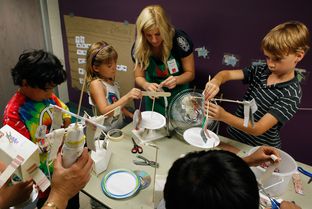Several studies by the US Department of Education show that American students are academically behind on STEM – science, technology, engineering, and math – subjects as compared to their peers in Europe and Asia. Personal struggles with the subject become more pronounced when students specialize in college: I have friends in the humanities who loathe science, and many fellow students question my desire to take more science than I “have” to. With STEM careers increasing in the future, proper preparation in younger kids is essential, and one non-profit has a pretty comprehensive model.

The Next Generation Science Standards, which were developed by the educational non-profit Achieve, detail grade-specific recommendation for students’ knowledge of physics, biology, earth science, engineering, technology, and applications of such. For example, in the core area of life science, a kindergartener would know what basic things plants and animals need to survive, whereas a middle schooler would know how a cell and each of its components works.
The NGSS program isn’t endorsed by the DOE, and even though 26 states contributed to its construction, political and religious conflicts could prevent its success because it includes controversial topics such as evolution and climate change. Scientists universally agree that evolution is an integral part of life science, but the country is pretty evenly divided between evolution and some involvement of a divine creator. The program also includes content relating to the human impact on climate change, a view that some conservatives think is alarmist.
It’s going to be impossible to get everyone on the same page – Texas’ DOE has already given a flat-out rejection of the plan – but a plan such as the NGSS would be greatly beneficial to education in the US. Students need to have a fundamental understanding of how our world works, and the US needs young, intuitive, and inquisitive thinkers to sustain the innovation of the future.






